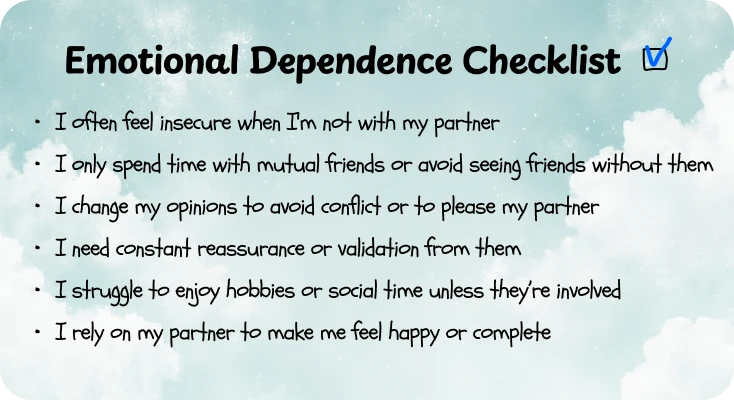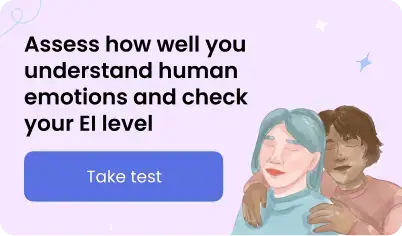You need love, support, and to seek constant approval, but you think it has to come from other people, not yourself. Are you missing something without your partner’s love, attention, or maybe even permission?
This is known as emotional dependency, a state where your emotional well-being heavily depends on another person’s presence, actions, and feelings. Mostly, it’s happened in adult relationships and stems from emotional attachment trauma in adulthood.
If you need your partner to take care of all your emotional needs, be your only friend, or even act like your parents, these are warning signs. In this blog post, we’ll explore the concept of emotional dependency, its causes, common signs, and how you can take a self-assessment test to evaluate your attachment style.
What is Emotional Dependency?
Emotional dependence, or ED, is a long-term pattern of unmet own emotional needs that people desperately try to meet through close relationships and where they rely excessively on their partner for emotional support, validation, and happiness, more than on their own abilities to have those needs met in other ways. Childhood events, attachment styles, and unresolved traumas are common causes of this behavior in adulthood.
Actually, most romantic partners are dependent on each other at some level, and it’s completely okay if it’s in a healthy balance. That is why we form relationships: to create intimacy, feel connected and understood, and mutually rely on one another.
But a high level of emotional dependency can lead to codependency in relationships, where one dependent person’s identity is tied to the relationship. As a result, that partner may struggle to understand their own identity and desires independently of their partner.
What Is Interdependency?
Interdependence is different (it’s not hyperindependence). Interdependency occurs when two autonomous individuals choose to be together and form a relationship. You find personal fulfillment in your own interests, accomplishments, and relationships while also being able to be dependent on your partner from time to time.
Is it Love or Emotional Dependency?
One of the most significant differences between love and emotional dependency is the level of independence in the relationship.
- Love involves setting and respecting boundaries to ensure both partners feel comfortable and secure. In a loving relationship, both partners can maintain their individuality and personal interests—those are green flags in relationships.
- Unlike healthy relationships, where both partners are emotionally independent, emotional dependency creates an imbalanced dynamic, where one person seeks out the other to be their “everything.”
Is your relationship primarily dependent or interdependent? To respond, consider the following Breeze self-reflection prompts 1 or 2. Then, choose which expression accurately represents your relationship.
1. I am completely reliant on my partner I am only happy when my partner is around. They’re bringing me to completion. I am like Yin, and they are like Yang, we are soul ties.
2. We form an excellent team. I am happy that we are together, but I am aware that we may break up one day, but today I choose you and this relationship.
If you choose the first option, you may be in a codependent relationship. If you chose the second statement, your relationship might be interdependent.
How Emotional Dependency Can Look in Relationships
While it’s natural to seek comfort in your partner, emotional dependency crosses the line into needing them constantly to feel whole. This can manifest in an overwhelming need for approval, constant reassurance, and an inability to feel secure or happy without the partner’s presence.
Imagine a scenario where your mood and own sense of worth fluctuate based on whether or not your partner is attentive to you consistently and throughout the day, every day. For instance, if they don’t text back immediately, you may start feeling anxious or unworthy, seeking the answer, “Why does my boyfriend hate me?” and begin to question your value and whether your partner wants to be with you.
Some scholars on the topic state that a person with ED acts like someone who is addicted to drugs: they can’t help but want to be with the person they’re dependent on, they require their presence obsessively, and they have negative reactions when they’re not around. [1]
5 Symptoms of Emotional Dependency
To better understand if you’re emotionally dependent on your partner, here are five key signs to watch out for.
1. Constant need for reassurance from partner
One of the most apparent signs of dependency is the constant need for reassurance. If you find yourself frequently seeking validation from your partner, frequently asking if they love you, or needing their approval for everyday decisions, it might indicate dependency issues.
2. Constant fear of being alone or being left
Another sign that you may be too emotionally dependent on your partner is an obsessive fear of being alone. Emotionally dependent people may feel anxious or uncomfortable when their partner isn’t around because they don’t know how to be happy while alone. They may struggle with feelings of abandonment and loneliness, even if the separation is temporary.
3. There are only our interests and time spending, not yours
Emotionally dependent partners also tend to sacrifice their interests and hobbies to please their partner. They may abandon activities they once enjoyed to spend more time with their partner, hoping to gain approval, acceptance, and affection.
4. Excessive jealousy
Your partner’s friendships and interactions with other people might make you feel threatened, and you are constantly reading articles with titles like “Why people cheat.” Constant feelings of jealousy about your partner’s interactions with others can be a sign of emotional dependency, too.
5. Difficulty making decisions by yourself
Moreover, you may be seeking constant approval before making decisions, whether big or small. Making choices without your partner’s help or approval can be another sign of emotional dependence.
Emotional Dependence Checklist

What Causes Emotional Dependency?
So, what might be at the root of falling into emotional dependency in relationships?
Our childhood and past traumas
If you grew up in an environment where emotional support was lacking or inconsistent, or if you have been emotionally neglected, there is a risk you might develop dependency patterns in relationships as an adult. [2] This can be a way of filling that emotional void left by your caregivers.
Low Self-Esteem
Some people with low self-esteem are more likely to develop emotional dependency because they are willing to accept even minor and unhealthy moments of connection and validation. This causes a tendency to overly connect with the first person who offers any sign of reassurance, viewing that person as a perfect fit when they may not be, which can lead to unhealthy bonds and acceptance of unhealthy relationships.
Fear of Abandonment
A constant fear of abandonment can also lead to dependency. If you’ve experienced past relationships where you were left behind, you might cling harder to your current partner to avoid experiencing that pain again.
A Lack of Emotional Permanence
Another reason for emotional dependence is emotional impermanence. Emotional permanence is the idea that feelings and relationships can last over time, even if you are not with them or can not feel them all the time.
A lack of emotional permanence can make it hard for people to trust that their partner’s love and devotion will last if they don’t receive constant validation and reassurance. This doubt leads to a reliance on constant validation and reassurance, which reinforces dependency in relationships. The cycle continues, causing increased anxiety and insecurity.
Attachment Styles and Their Role
Attachment theory helps a lot in understanding emotional dependency. People with an anxious attachment style are more prone to becoming emotionally dependent. For example, they worry about being alone and need their partners to reassure them all the time. People who have a secure attachment style, on the other hand, are less likely to act dependent because they know how to meet their own needs.
Previous Relationship Trauma
If you’ve experienced abandonment or betrayal in previous relationships, you might cling to your current partner out of fear of repeating an ending from past relationships. It’s like emotional baggage you never unpacked.
Emotional Dependency Test
Do you think you might be emotionally dependent on your partner? Take this quick self-assessment to find out. Remember that this is just the beginning of self-awareness, not a definitive diagnosis.
- Do I often seek my partner’s approval before making decisions?
- Do I feel anxious or uneasy when my partner spends time with other friends?
- Am I always concerned about the stability of my relationship?
- Is my partner’s absence making me feel incomplete or worthless?
- Do I always let my partner make decisions for me?
- Do I need others to make me happy because I can’t find my true happiness or be alone?
What are the results? Answering “yes” to most of the questions above may indicate a higher likelihood of emotional dependency in your relationship. Use these insights to consider your relationship dynamics, and if necessary, seek professional help.
How to Stop Being Emotionally Dependent
So, if the results of the self-test above have you asking yourself, “How might I be less dependent on my partner?” and overcome emotional dependency, here are some tips:
Expert Insight
Emotional dependency comes from an attempt to fill a void, to fill an emotional need, and to define ourselves through our relationships with others. If you want to overcome emotional dependency, noticing the patterns within yourself is a crucial first step. Notice your driving thoughts, expectations, needs, and fears, and then how you respond to those various pieces. So much of the work is learning to shift that focus from other people back onto yourself. Healing what needs to be healed, rediscovering who you are as an individual, and learning through the process that you are capable of healing and meeting your own needs.
Stephanie Palacios
Mental health professional
1. Find What Makes You You
Pay attention to times when you depend too much on your partner’s approval or opinion. Simply ask yourself, “What do I like?” What are my values? Which of my strengths do I have? What am I good at?
Make a list and try to do those at least once a week to fix your anxious attachment. Additionally, revisit old hobbies, explore new interests, and reconnect with parts of yourself that existed before the relationship.
2. Build Your Own Life Outside of Relationships
Create a daily rhythm that doesn’t depend on your partner’s presence or relationship goals. It should be all yours. This could mean setting personal goals, joining a class, or focusing on career or self-development projects. When you have your own path, you bring more energy and depth into the relationship.
3. Use Positive Self-Talk
Positive affirmations like “I’ve dealt with problems before, and I can do this again” can help you replace negative thoughts like “I can’t handle this without them.” This can help you build self-esteem and self-love that is based on your own belief system rather than someone else’s.
4. Set Boundaries
Healthy relationships require space to breathe. This applies to both of you equally. Talk openly with your partner about your needs, your deal-breakers, and the importance of having time for yourself.
Setting limits protects your personal space, the space of your partner, and keeps you from experiencing emotional exhaustion that can happen after spending 24 hours a day with someone and dealing with their feelings.
5. Learn How to Spend Time Apart
Set up regular things to do by yourself, like going for walks, having coffee with friends, or doing hobbies on the weekends. This lets you both stay independent while also giving you a chance to miss each other and get back in touch with new energy.
6. Try Breeze
Try also helpful guides to be more stable in relationships:
Take a quick Breeze self-test to check where you stand on emotional independence. The insights can guide you toward small, intentional changes that make you a more confident and self-reliant partner.
7. Seek Professional Help
Therapy can help you face reality and understand these roots, and give you tools to build emotional self-sufficiency too. A therapist acts as a neutral guide, helping you practice independence in a safe and supportive environment for mental health.
Frequently asked questions
Is emotional dependency a mental disorder?
It can affect relationship dynamics, but it is not a mental disorder. It describes some unhealthy patterns in relationships in which one partner relies on another to bolster their self-worth.
Can emotional dependency be cured?
Yes, you can reduce the level of emotional dependency in relationships. For this, reflect on your habits, set boundaries, and invest in self-care and mental health.
Is emotional dependency the same as love?
No, emotional dependency means relying entirely on someone else to help you deal with your emotions and meet your emotional needs, while love is where both partners can maintain their emotional independence and also be dependent when needed.
Sources:
- Villa Moral Jiménez, M. D. L., & Sirvent Ruiz, C. (2009). Dependencia Afectiva y Género: Perfil Sintomático Diferencial en Dependientes Afectivos Españoles. Interamerican Journal of Psychology
- Evgin D, Sümen A. Childhood abuse, neglect, codependency, and affecting factors in nursing and child development students. Perspect Psychiatr Care. 2022
- Bacon, I., McKay, E., Reynolds, F. et al. The Lived Experience of Codependency: an Interpretative Phenomenological Analysis. Int J Ment Health Addiction.
Disclaimer
This article is for general informative and self-discovery purposes only. It should not replace expert guidance from professionals.
Any action you take in response to the information in this article, whether directly or indirectly, is solely your responsibility and is done at your own risk. Breeze content team and its mental health experts disclaim any liability, loss, or risk, personal, professional, or otherwise, which may result from the use and/or application of any content.
Always consult your doctor or other certified health practitioner with any medical questions or concerns
Breeze articles exclusively cite trusted sources, such as academic research institutions and medical associations, including research and studies from PubMed, ResearchGate, or similar databases. Examine our subject-matter editors and editorial process to see how we verify facts and maintain the accuracy, reliability, and trustworthiness of our material.
Was this article helpful?






